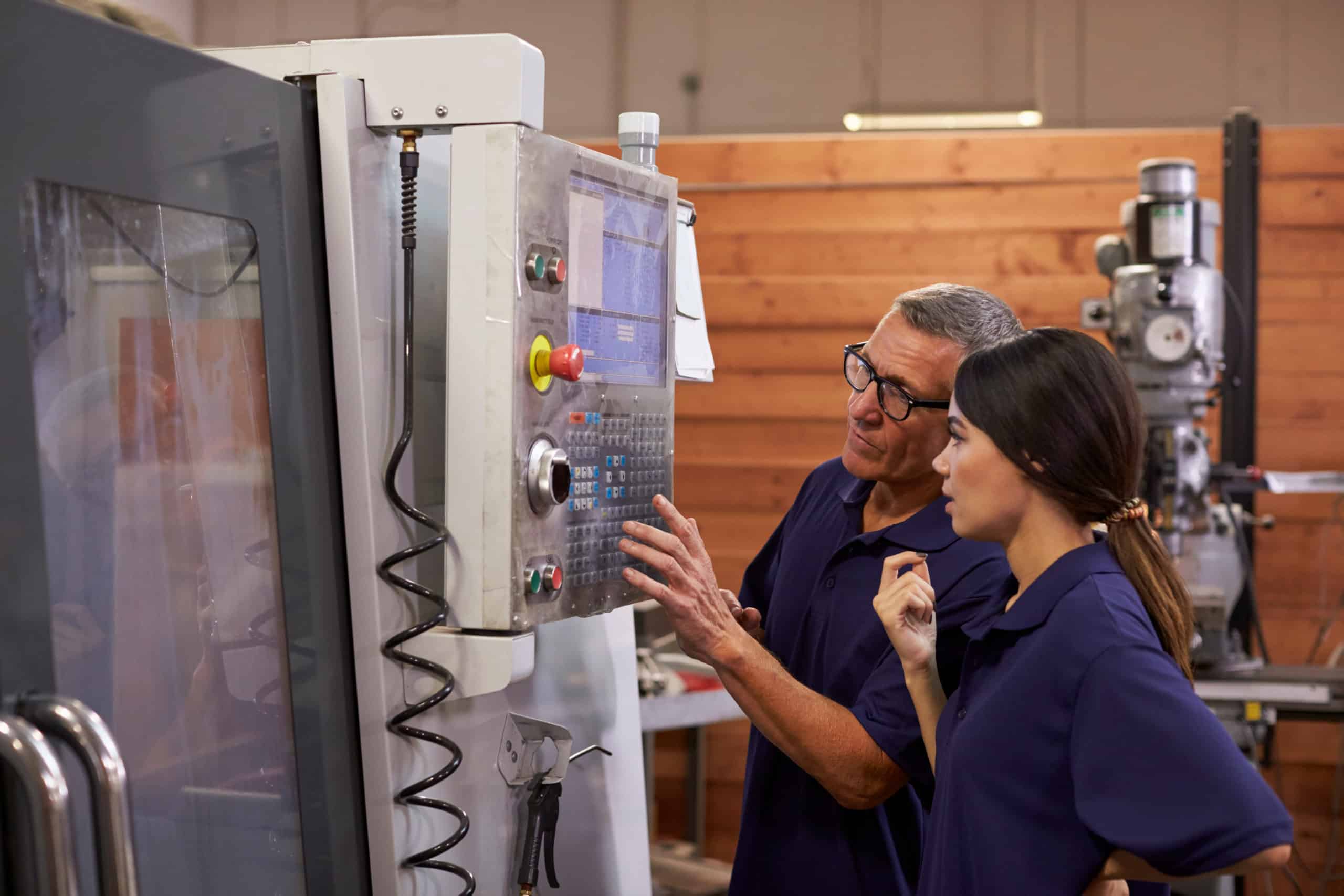Table of Contents
Are you considering a career as a CNC machinist but unsure of the time commitment required for training? Look no further! In this article, we will explore the various paths to becoming a CNC machinist and discuss the length of time each option may take.
CNC machinist training can range from a few months to several years, depending on the program or apprenticeship chosen. Let’s dive into the details and uncover which training option may be the best fit for you.
CNC Machinist training can take anywhere from a few months to two years, depending on the program and level of certification desired. A certificate program may only take a few months to complete, while an associate’s degree program can take up to two years. The length of time can also vary based on whether the program is taken full-time or part-time.
How Long Does CNC Machinist Training Take?
CNC (Computer Numerical Control) machining is an ever-growing industry with plenty of opportunities for skilled workers. CNC machinists are responsible for operating and maintaining complex machinery that produces precision parts for various industries. If you are interested in pursuing a career as a CNC machinist, you may be wondering how long the training process takes. Here, we’ll explore the different paths you can take to become a CNC machinist and how long each one typically takes.
1. Apprenticeship Programs
Apprenticeships are a popular option for those interested in becoming CNC machinists. These programs typically last between 2-5 years, depending on the level of education and experience you have when you enter the program. Apprenticeships combine on-the-job training with classroom instruction, allowing you to learn the necessary skills to become a CNC machinist while earning a living wage.
During an apprenticeship, you’ll learn how to read blueprints, set up machines, and program CNC equipment. You’ll also learn about safety protocols, quality control, and materials science. Apprenticeship programs are typically offered by trade unions or industry associations, and admission is often competitive. The benefit of an apprenticeship is that you’ll earn a wage while you learn, and you’ll have the opportunity to network with industry professionals.
2. Certificate Programs
Certificate programs are another option for those interested in becoming CNC machinists. These programs typically last between 6-12 months and are offered at technical schools, community colleges, and vocational schools. Certificate programs provide a more focused education than apprenticeships, with a curriculum that is tailored specifically to CNC machining.
In a certificate program, you’ll learn the fundamentals of CNC machining, including programming, blueprint reading, and machine setup. You’ll also learn about materials science, quality control, and safety protocols. The benefit of a certificate program is that it is typically less expensive and takes less time to complete than an apprenticeship.
3. Associate’s Degree Programs
For those interested in a more comprehensive education, an associate’s degree program in CNC machining may be the right choice. These programs typically last two years and are offered at community colleges and technical schools. An associate’s degree program provides a more in-depth education than a certificate program, with a focus on liberal arts and general education in addition to CNC machining coursework.
In an associate’s degree program, you’ll learn about CNC machining in the context of the broader manufacturing industry. You’ll take courses in mathematics, physics, and computer science, as well as courses specific to CNC machining. An associate’s degree program is a good choice if you want to pursue higher-level positions in the CNC machining industry, such as management or engineering.
4. On-The-Job Training
Some CNC machinists learn their trade through on-the-job training. This usually involves starting as an entry-level machine operator and working your way up through the ranks. On-the-job training can take anywhere from a few months to a few years, depending on the complexity of the machines you are working with and the level of education you have.
The benefit of on-the-job training is that you are earning a wage while you learn, and you are gaining hands-on experience that is directly applicable to your job. However, on-the-job training may not provide as comprehensive an education as a formal apprenticeship, certificate program, or associate’s degree program.
5. Online Training
There are also online training programs available for those interested in becoming CNC machinists. These programs typically offer a more flexible schedule than traditional apprenticeships, certificate programs, or associate’s degree programs. Online training can take anywhere from a few months to a year to complete, depending on the program.
In an online training program, you’ll learn the same skills as you would in a traditional program, but you’ll do so through online coursework and virtual labs. The benefit of online training is that it is typically less expensive than traditional programs and allows you to work at your own pace.
Conclusion
In conclusion, the length of CNC machinist training depends on the path you choose. Apprenticeships typically last between 2-5 years, certificate programs take 6-12 months, associate’s degree programs take two years, on-the-job training can take anywhere from a few months to a few years, and online training can take a few months to a year. Regardless of the path you choose, becoming a CNC machinist requires dedication, hard work, and a willingness to learn new skills. With the right training, you can enjoy a rewarding career in this growing industry.
Frequently Asked Questions
In this section, we will answer some of the frequently asked questions about CNC machinist training.
How long does CNC machinist training take?
CNC machinist training can take anywhere from a few weeks to a few years. The length of the training depends on the type of program you choose, your previous experience in the field, and your level of commitment to the program.
For example, a certificate program in CNC machining may take only a few weeks to complete, while an associate degree program may take two years. A four-year bachelor’s degree program in manufacturing engineering can also be an option for those seeking more advanced training.
What topics are covered in CNC machinist training?
CNC machinist training covers a wide range of topics, including blueprint reading, math for machinists, computer-aided design (CAD), computer-aided manufacturing (CAM), manual machining, CNC programming, and machine operation. The training also covers safety procedures and quality control measures that are essential in the manufacturing industry.
As CNC machining technology continues to evolve, training programs also include courses on the latest software and hardware used in the industry. Some programs also offer specialized training in areas such as welding, robotics, and automation.
What are the requirements for CNC machinist training?
The requirements for CNC machinist training vary depending on the program you choose. Most programs require a high school diploma or GED, and some may require prior experience in manufacturing or machining. Some programs may also require students to pass a math or reading assessment before enrolling in the program.
It is also important to have good mechanical and problem-solving skills, as well as the ability to work with precision and attention to detail. Strong computer skills and familiarity with programming languages are also essential for success in the field.
What are the job prospects for CNC machinists?
The job prospects for CNC machinists are promising, as the demand for skilled workers in the manufacturing industry continues to grow. CNC machinists can find employment in a variety of industries, including aerospace, automotive, medical device manufacturing, and more.
According to the Bureau of Labor Statistics, the employment of machinists is projected to grow 3% from 2019 to 2029, which is about as fast as the average for all occupations. The median annual wage for machinists was $44,420 in May 2020.
What skills do I need to succeed as a CNC machinist?
Success as a CNC machinist requires a combination of technical and soft skills. Technical skills include proficiency in blueprint reading, CAD/CAM software, and machine operation. Soft skills such as communication, problem-solving, and attention to detail are also important.
As a CNC machinist, you will also need to be able to work independently and as part of a team, as well as be able to adapt to new technologies and processes as they emerge. Continuous learning and professional development are also essential to stay current in the field.
In conclusion, the length of CNC machinist training can vary depending on the program and the individual’s prior experience. However, it typically takes between 6 months to 2 years to complete.
It’s important to note that while the duration of the training may seem daunting, the skills and knowledge gained during the program are invaluable in the machining industry. The training not only teaches the technical aspects of operating the CNC machines but also includes safety protocols, quality control, and programming language.
Furthermore, with the increasing demand for skilled CNC machinists, completing the training can lead to numerous job opportunities with competitive salaries and benefits. So, if you’re considering a career in CNC machining, investing time and effort in the training can be a wise decision for your future.
Request a quote today!
[contact-form-7 id="1578" title="Contact form"]
Please compress the file into a ZIP or RAR file before uploading. Alternatively, send through your RFQ by email.
enquires@unitymanufacture.com





